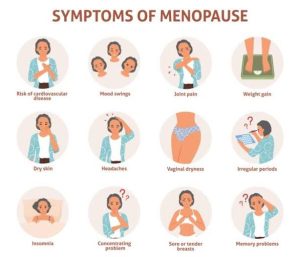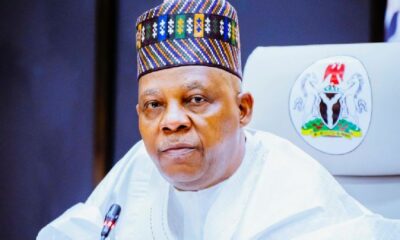Health
Menopause symptoms every woman should know

By Francesca Hangeior.
So, you’re already well aware that menopause typically goes hand-in-hand with a host of pesky symptoms, including mood changes, hot flashes and dry-down-there private parts (hey, just ask Drew Barrymore).
And maybe you’ve even heard that it can also cause trouble sleeping. But are you familiar with some of the lesser-known and unusual menopause symptoms, like burning mouth syndrome and tinnitus? Here’s everything you need to know.

Symptoms of Menopause
FIRST, WHAT ARE COMMON SYMPTOMS OF MENOPAUSE
In addition to the weird stuff (more on that later), there are common symptoms associated with menopause, too. It all starts with irregular periods, which will become less frequent over time and ultimately cease.
Once changes to menstruation start, it’s an indication that estrogen levels are dropping (permanently) and you’re liable to experience a number of other physical symptoms as a result—including hot flashes, night sweats, chills, vaginal dryness (and discomfort during sex because of it), weight gain due to slowing metabolism, difficulty sleeping and mood changes (irritability and random crying have been known to occur). Needless to say, none of this sounds very fun—but it is par for the course and, fortunately, these symptoms do most often become milder or even disappear in time.
10 UNUSUAL (AND LESSER-KNOWN) SYMPTOMS OF MENOPAUSE
And now, without further ado, here are the truly bizarre symptoms you likely haven’t heard of, but might want to brace yourself for.
BURNING MOUTH SYNDROME
Cat got your tongue? Nope, it’s probably Burning Mouth Syndrome—a not very well understood, but decidedly unpleasant menopause and postmenopause symptom that can cause “a painful, burning sensation in the tongue, lips, gums, or other parts of the mouth, which can be exacerbated by hot or spicy foods.” If you’re suffering from BMS, you won’t be able to see anything weird in your mouth—this syndrome is characterized by a sensation that occurs in the absence of lesions or other oral abnormalities—but you certainly will feel it.
If you’re experiencing this one, there are a number of things you can do to get some relief: Sucking on ice chips and avoiding acidic foods is a good place to start, but Mayo Clinic medical experts say that stubborn cases often respond to treatment with cognitive behavioral therapy, alpha-lipoic acid supplements, antidepressants or, ironically, capsaicin (among other things).
ELECTRIC SHOCK SENSATIONS
Some women experience sudden, sharp sensations that feel like electric shocks or jolts in various parts of the body, including the head, neck and limbs.” Pretty spooky, right? There’s very little research into Electric Shock Sensation (ESS) but women who experience it describe it as a “snap, crackle, pop” under the skin that often immediately precedes the infamous menopause symptom known as a hot flash. ESS is most likely triggered by hormonal fluctuations (duh) and, though quite bizarre, this harmless short-lived zap isn’t thought to be a condition that requires treatment, nor is it a cause for concern.
ITCHY SKIN
Decreased estrogen levels cause dry, itchy skin—and sometimes even the onset of eczema, rashes and hives—in many menopausal women. For more severe presentations, your physician might prescribe topical corticosteroids, but many women can find relief by taking warm, rather than piping hot, showers and generously applying over the counter moisturizers designed to protect the delicate barrier of aging skin.
BODY ODOR CHANGES
Menopause can cause changes in body odor—ranging from noticeably more potent to just plain different—due to changes in hormonal and metabolic activity, explains Dr. Afzal. Alas, there’s not much you can do about it besides embrace your new signature scent or stock up on strong deodorant.
INCREASED ANXIETY AND/OR DEPRESSION
If you’re feeling extra blue these days, you can blame menopause for that, too. According to research published in Obstetrics and Gynecology Clinics of North America, “vulnerability to depression is increased across the menopause transition and in the early years after the final menstrual period.” Indeed, Dr. Afzal confirms that “hormonal fluctuations during menopause can contribute to feelings of anxiety and depression, which can be debilitating for some women.” Anxiety and depression don’t have to be the new normal, though—antidepressants and other psych meds can be as effective for menopausal women as they are for the rest of the population, and behavioral interventions, including different modes of therapy, can go a long way to improving mental health symptoms, with or without medication.
HEART PALPITATIONS
Don’t be alarmed if your heart skips a beat, either: The expert tells us that hormonal fluctuations (i.e., the force behind all menopausal woes) can cause irregular heartbeats or palpitations, which are felt as an unusually rapid heart rate, in some women. According to the British Heart Foundation, these palpitations and irregularities are typically harmless and most often occur during hot flashes. Alas, reduced estrogen levels during menopause are also associated with an increased risk of heart disease, since said hormone plays an important role in protecting the arteries of a woman’s heart. As such, women who are experiencing this menopause-related symptom needn’t panic—after all, that won’t help your heart rate—but it’s wise to check in with your doctor and keep a closer eye on your heart health going forward, nevertheless.
JOINT PAIN
Hormone fluctuations, inflammation and other factors can contribute to joint pain in menopausal women. This unpleasant condition is called arthralgia, and although the causes are hard to pin down, a 2010 review published in Maturitas confirms that menopausal women are at considerably higher risk, and that decreased estrogen is likely to blame for exacerbating the symptoms of joint stiffness and pain. Fortunately, the same study suggests that Hormone Replacement Therapy (HRT) is proven to be effective at relieving arthralgia in the menopausal population, so it’s a treatment worth considering if you’re experiencing vasomotor symptoms that are particularly disruptive or distressing.
HAIR LOSS
In case you missed it, menopause can cause hair loss. Indeed, the combination of plummeting estrogen and progesterone levels that occurs during menopause “can cause hair to become thinner, drier, and more brittle, leading to hair loss or breakage. So, how to restore your lackluster locks to their former glory, you ask? For starters, there are a host of shampoos that boast hair-strengthening and volume boosting benefits. There are also OTC medicated treatments that encourage hair growth and even a medical procedure involving platelet rich plasma (PRP) injections that you can seek if the former options don’t deliver the desired results.
TINNITUS
Menopause can cause ringing or buzzing in the ears, which is known as tinnitus,” and yes, it can be a very annoying distraction to the unlucky women who experience this symptom. On the bright side, a 2018 nationwide study published in Oncotarget acknowledged the increased risk of tinnitus among menopausal women and identified Hormone Replacement Therapy (once again) as a treatment that may provide potential benefits in the management and prevention of the condition—so if this menopause-related hearing change has been plaguing you, it might be worth exploring the option with your doctor.
INCREASED URINARY TRACT INFECTIONS
Changes in the urinary tract during menopause can make women more susceptible to UTIs, the expert tells us, which can cause painful urination, frequent urination and other unpleasant symptoms. If you’re experiencing discomfort when urinating or a constant urge to go (and little relief for your effort), you should definitely inform your doctor, as antibiotics are the treatment of choice for UTIs.
Health
WHO calls for countries to address disruptions to TB services

In the wake of massive cuts in US funding, the World Health Organization (WHO) today called on global health leaders, donors, and policymakers to protect and maintain tuberculosis (TB) care and support services around the world.
In a statement issued ahead of World Tuberculosis Day (March 24), the WHO said the “drastic and abrupt” cuts to global health funding threaten to reverse gains made in global efforts to combat TB, which remains the world’s deadliest infectious disease. Those efforts have saved an estimated 79 million lives worldwide since 2000, the organization said.
“The huge gains the world has made against TB over the past 20 years are now at risk as cuts to funding start to disrupt access to services for prevention, screening, and treatment for people with TB,” said WHO Director-General Tedros Adhanom Ghebreyesus, PhD. “But we cannot give up on the concrete commitments that world leaders made at the UN General Assembly just 18 months ago to accelerate work to end TB. WHO is committed to working with all donors, partners and affected countries to mitigate the impact of funding cuts and find innovative solutions.”
USAID cuts have crippled TB control efforts
While the statement does not specifically mention the US Agency for International Development (USAID), the Trump administration’s freeze of USAID funding, and the subsequent canceling of thousands of contracts issued by the agency, have left a gaping hole in funding for TB prevention, screening, and treatment services. The US government has been the leading bilateral donor to global TB control efforts, contributing $200 million to $250 million annually—roughly one quarter of international donor funding for the disease.
The WHO said 27 countries are facing crippling breakdowns in their TB response, with the biggest impact seen in high-TB burden countries in Africa, Southeast Asia, and the Western Pacific. Among the services that have been disrupted are diagnosis, active case finding, screening, and contact tracing, and those disruptions are resulting in delayed detection and treatment and increased transmission risk. Drug supply chains, laboratory services, and data and surveillance systems have also been undermined.
A recent update from StopTB Partnership, which works on TB response with more than 2,000 partners in 100 countries, provides some detail on the services affected by the USAID funding cuts. In Cambodia, active case finding has halted in half the country, resulting in 100,000 people missing TB screening and 10,000 cases of drug-susceptible (DS)-TB going undetected. In Kenya, sputum sample transport once supported by USAID has halted, affecting the diagnosis of DS- and drug-resistant (DR)-TB. In India, USAID-funded TB screening projects in vulnerable groups have stopped.
The huge gains the world has made against TB over the past 20 years are now at risk as cuts to funding start to disrupt access to services for prevention, screening, and treatment for people with TB.
Those are just three of dozens of examples. In a news release today, StopTB Partnership Executive Director Lucica Ditiu, MD, echoed Tedros’s call for action.
“People with TB need us,” Ditiu said. “We have to remain strong, and we can never ever give up the fight. Through innovative, global and national efforts and standing together, we will be able to achieve these targets of ensuring TB prevention, treatment, and care are accessible to all.”
TB was responsible for an estimated 1.25 million deaths in 2023, according to the WHO’s most recent annual report. An estimated 8.2 million people were newly diagnosed with the disease—the most cases in a year recorded by the WHO since it began global TB monitoring in 1995. High-burden TB countries have only recently begun to recover from the disruptions caused by the COVID-19 pandemic, which the WHO estimates resulted in 700,000 excess TB deaths.
Cuts exacerbate funding shortfalls
As the WHO notes, the funding cuts come amid what was already a shortfall in funding for global TB control efforts. In 2023, $5.7 billion was available for TB prevention, diagnostic, and treatment services in low- and middle-income countries, but that’s only 26% of the 2027 target goal of $22 billion. TB research is receiving just one fifth of its 2022 target of $5 billion. Cuts to US funding are only going to exacerbate the problem.
In a joint statement issued earlier this week, Tedros and the Civil Society Task Force on Tuberculosis called on countries to take urgent action to prevent any disruption to TB services, ensure domestic resources to sustain equitable and essential TB care, and safeguard essential TB drugs, diagnostics, care, and social protection coverage for TB patients. They also urged the establishment of national partner platforms that would bring together public and private sectors, civil society, nongovernmental organizations, professional societies, and donors to maintain momentum against TB in affected countries.
“This urgent call is timely and underscores the necessity of swift, decisive action to sustain global TB progress and prevent setbacks that could cost lives,” said Tereza Kasaeva, PhD, director of WHO’s Global Programme on TB and Lung Health, in today’s WHO news release.
Health
Women with VVF can have normal s3xual lives after treatment, say gynaecologists

By Francesca Hangeior
After proper surgical repair, women who have a vesicovaginal fistula, an abnormal opening between the bladder and the vaginal wall, leading to urine leakage and other complications, can have a pleasurable sexual life, gynaecologists have assured.
They advised such women to wait until 12 weeks after the surgery to allow complete healing and recovery before resuming sexual activities.
The maternal experts, however, stated that the return to normal sexual life depended on the delays before the repair was done and the scarred tissues that were formed, stating that some of the women might experience vagina tightness and pain during sex.
The fertility experts further emphasised the need for counselling and psychotherapy before resuming sexual activity, to ensure that the fear, anxiety, and emotional trauma related to sex and pregnancy were overcome.
According to the seasoned obstetric gynaecologists, women with repaired VVF, who desired more children, could become pregnant and have more babies.
However, they stressed that such delivery must be through a caesarean section and done in a conventional health facility.
VVF is a complication of obstructed labour during delivery. According to the United Nations Population Fund, VVF is a major public health problem with over two million cases, globally.
In Nigeria, there are about 150,000 cases with 12,000 new cases recorded every year.
Many women with VVF in Nigeria battle with stigma, leading to social ostracisation, abandonment, and psychological distress.
Also, a professor of Obstetrics and Gynaecology at the Usmanu Danfodiyo University, Abubakar Panti, stated that after the successful closure of the fistula and complete healing after surgery, normal sexual activity could be restored.
He further stated that to ensure proper healing and recovery time, the recommendation was to avoid sexual activity for at least three months, which is 12 weeks post-surgery to allow complete healing.
The don also stated that before resuming sexual activity, the strength of the pelvic floor must be assessed, as some women may experience vaginal tightness or weakness after prolonged fistula, which could affect sexual comfort.
To resolve this, Panti advised the women to do some pelvic floor exercises, noting that sometimes the help of a physiotherapist was needed.
“When women have lived with VVF for a long time, they know what caused it, they know it’s a pregnancy that caused it, so they may experience fear, anxiety or some form of emotional trauma related to sex, because they would think sex is what brought it in the first place, so they need a lot of counselling or therapy, in that instance psychotherapy may be beneficial.
“Some of these women used to have a lot of terrible experiences, sometimes they are abandoned by their husbands, divorced and other things, so they think every man may be like that.
“The last one probably would be the presence of scarring or vaginal shortening. If extensive damage occurred before repair, some women may have vaginal scarring and then sometimes there will be dryness of the vagina or reduced elasticity.
“Usually, the vagina distends to accommodate, irrespective of the size of the penis that comes into it, so if there is scarring, that distension will not be there, and there will be tightness, so this can also affect comfort during sex. Most of the time we just tell them to apply lubricants and sometimes medical interventions may help,” the fertility expert said.
Panti asserted that with successful surgery, proper healing and emotional support, many women regained a satisfying sexual life.
He advised the women to whenever they had concerns or difficulties, consult their gynaecologist, who would give them tips regarding the repair, sexual health and resuming sexual activity.
Panti emphasised the need for counselling the woman and her husband, “because it needs a lot of patience from the partner, that he has to start slow and of course, he has to listen to her or look at her body language if she’s in any discomfort or experiencing pain so that he can stop, rest and try again.”
The don advised the women to watch out for symptoms like leakage of urine and consult with the gynae if there’s discomfort during sex.
The consultant gynaecologist urged them to focus on their overall wellness by eating well and preventing urinary tract infections.
“With proper healing, patience and emotional support, most of them regain their full sexual life after VVF repair, the key is to slow down, communicate with your partner and seek medical advice where needed,” Panti said.
He further stated subsequent delivery after VVF must be by caesarean section, to prevent a reopening of the repair.
Health
Gynecologist’s caution pregnant women against Vaginal delivery after two CS

By Francesca Hangeior
Attempting labour and vaginal delivery after two previous caesarean sections could lead to a rupture of the uterine scar, resulting in severe bleeding and possible death of the expectant mother and her baby, maternal experts have warned.
The gynaecologists further noted that such deliveries posed risks of head compression and low oxygen supply and intake, leading to malformations.
The experts’ warning comes amid the stigma surrounding CS and the insistence of many Nigerian women who have previously undergone the procedure to attempt vaginal delivery in subsequent births.
Bleeding during and after delivery is a major cause of maternal mortality worldwide and in Nigeria.
In fact, it is the leading cause of maternal mortality in Nigeria, a country with one of the highest MMR in Africa.
The Nigeria Demographic and Health Survey, 2018, pegs the MMR at 512 deaths per 100,000 live births.
According to the World Health Organisation, every year, about 14 million women experience postpartum haemorrhage, resulting in about 70,000 maternal deaths globally.
A new study released by the WHO two weeks ago further revealed that severe heavy bleeding and hypertensive disorders like preeclampsia are the leading causes of maternal deaths globally.
It noted that the conditions were responsible for about 80,000 and 50,000 fatalities, respectively, in 2020, indicating that many women still lack access to lifesaving treatments and effective care during and after pregnancy and birth.
The experts urged expectant mothers to register for antenatal care and ensure delivery in healthcare facilities with skilled birth attendants to reduce risks and ensure optimum care for both mother and child.
A recent study on “Trial of labour following two previous caesarean sections – A UK cohort study” concluded that women considering a trial of labour following two caesarean sections had an increased risk of endometritis (infection of the inner lining of the uterus), sepsis and adverse neonatal outcome.
Providing expert insight into the matter, a Professor of Obstetrics Gynaecology at the College of Health Science, University of Uyo, Akwa Ibom State, Aniekan Abasiattai, explained that after a woman undergoes CS, the cut, after healing, forms a scar.
The don added that a woman who has undergone CS twice and in subsequent pregnancy attempts to go into labour and vaginal delivery, had an increased risk of tearing the scar, leading to bleeding.
He further noted that although women who have had one caesarean delivery could be allowed to attempt a vaginal delivery, it was done in specialised units and with close monitoring.
“Now, after two caesarean sections, because of the increased risk of rupture of the scar, which is much more than that of a previous caesarean delivery, in this environment, we usually do not allow our patients to attempt a vaginal delivery after two previous caesarean sections. That’s the standard in this country.
“I’m aware that there are varying publications of successful vaginal deliveries after two previous caesarean sections, both in the developed world, foreign literature, and even among a few of our colleagues, but we usually do not, that is not the accepted practice, basically, because of the increased risk of infection following surgical procedures, deliveries, whether vaginal or caesarean delivery,” Abasiattai said.
Speaking on the impact on the babies, the gynaecologist said, “When the uterus ruptures, it cuts off and the baby becomes affected directly. Low oxygen transfer, hypoxia sets in, and the rate of death or foetal mortality is quite high. Even in some instances, more than 50 per cent following rupture of the scarred uterus.
“So apart from the fact that the woman can have complications from excessive haemorrhage from the torn uterus, the baby, in a significant proportion of cases, dies inside the uterus. Unless surgical intervention is done promptly to arrest the ongoing haemorrhage, repair or stop the bleeding and then deliver the baby.”
The researcher on Community Obstetrics, Fetomaternal Medicine and Reproductive Health urged women who have had previous CS to refrain from having their next delivery at unconventional health facilities, stating that they had an increased risk of a ruptured uterus, among other complications.
Also, a Professor of Obstetrics and Gynaecology at the Obafemi Awolowo University, Ile-Ife, Osun State, Ernest Orji, stated that it was not safe for a woman to attempt labour and vaginal delivery after having two caesarean sections.
He explained, “It’s risky because the womb has been cut two times, and they say you don’t use a wounded soldier to go to battle. The chances of tearing or rupturing during labour are high.
“That’s why we tell women that if you have had caesarean section two times it is not safe to allow you to go into labour because during labour, the womb will be contracting and pushing and so the risk of the womb rupturing and the mother and baby dying is very high.”
The don stated that although there were reports of some women who despite having a history of two CS, tried vaginal delivery and went unscathed, such procedure was not advisable.
Speaking on the implications for the mother and baby, Orji said, “The first danger is that the womb can tear and when that happens, the baby may die depending on the site of the tear. The tear would make the woman start bleeding and when the bleeding is too much, she can bleed and die.
“When the woman is bleeding and is rushed to the hospital, sometimes, by the time they come to the hospital, it may be too late and you will have to remove the womb.
“So, apart from the risk that the woman may die, another risk is the fact that you may have to remove the womb because the womb may be so damaged that it can no longer be repaired.”
The researcher on Reproductive and Feto-maternal health further stated that the babies born through such a process may have their heads compressed, which could affect the babies’ brain and intellectual performance later in life.
-

 News15 hours ago
News15 hours agoAmbassadorial list ready for NASS review after DSS clearance – FG
-

 News23 hours ago
News23 hours agoMichelle Obama Speaks On Alleged Failed Marriage with Her Husband Barack Obama
-

 News11 hours ago
News11 hours agoSecurity operatives halt attempt to break into VP Shettima’s residence, nab suspect
-

 News10 hours ago
News10 hours agoSuit Seeking To Sack Ibas As Administrator Suffers Heavy Setback
-

 News8 hours ago
News8 hours agoIbas pouring petrol on fire in Rivers, Briggs laments
-

 News16 hours ago
News16 hours agoPopular actress passes away + Photo
-

 News3 hours ago
News3 hours agoConstituents Drag Akpabio, Senate to Court Over Suspension of Natasha
-

 News15 hours ago
News15 hours agoFG Issues Flood Warning for 30 States and FCT in 2025: Communities Urged to Prepare (Full List)
















